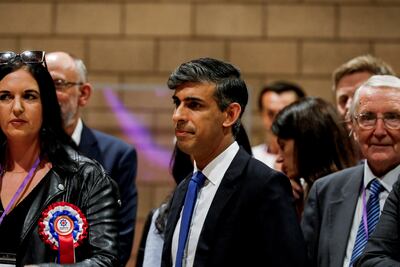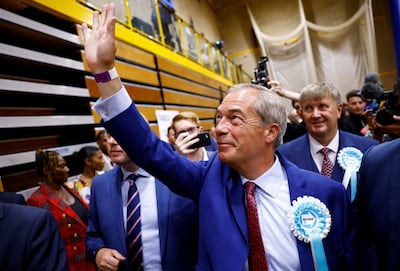Live updates: Follow the latest news on the UK general election
Keir Starmer promised to "rebuild Britain" in his first speech outside his new office at 10 Downing Street on Friday.
Speaking immediately after being appointed Prime Minister by King Charles III at Buckingham Palace, he told a crowd of supporters "the work of change begins immediately".
He said: "It is surely clear to everyone that our country needs a bigger reset, a rediscovery of who we are, because no matter how fierce the storms of history, one of the greatest strengths of this nation has always been our ability to navigate a way to calmer waters."
Mr Starmer, a 61-year-old former barrister promising economic renewal and a British re-engagement with the world, promised a “government of service” that he said would act “in the mission of national renewal”.
“When the gap between the sacrifices made by people and the service they receive from politicians grows this big it leads to a weariness in the heart of a nation,” he said. “This lack of trust can only be healed by actions, not words.”
The Labour leader swept into Downing Street after his party won a landslide majority to end 14 years of Conservative rule, crossing the threshold of 326 seats needed for a majority shortly before 5am, UK time, as count after count showed Mr Starmer’s party making historic gains in once-solid Tory strongholds.
“Change begins now,” Mr Starmer told cheering supporters at daybreak.
Mr Sunak apologised for his party's dismal performance in the general election as he announced his resignation as party leader during his final speech in Downing Street.
"I am sorry. I gave this job my all," he said. “I have heard your anger, your disappointment, and I take responsibility”.
He also apologised to Tories who had lost their seats.
"Whilst he has been my political opponent, Keir Starmer will shortly become our prime minister," he said.
"His successes will be all our successes, and I wish him and his family well whatever our disagreements in this campaign.
"This is a difficult day at the end of a number of difficult days. But I leave this job honoured to have been your prime minister."
With that, Mr Sunak headed to Buckingham Palace to meet King Charles III to tender his resignation as prime minister – paying the price for years of political and economic strife.
Mr Starmer then made his way to the palace to meet with the monarch, who appointed him as the UK’s seventh Labour prime minister and its first since 2010.
Labour will have at least 412 seats once all results are counted, with the Conservatives on around 121 – giving Mr Starmer a resounding margin of victory similar to that achieved by Tony Blair in 1997. Two seats remained still to declare on Friday afternoon.
But Labour also suffered setbacks, with pro-Palestinian independents claiming several shock victories. Results suggested a revolt against Mr Starmer in areas with a high Muslim population, which are traditionally loyal to Labour.
Independent candidate Shockat Adam declared “this is for Gaza” as he unseated Labour frontbencher Jonathan Ashworth in Leicester South, while the former ultra-safe Labour seat of Blackburn backed independent candidate Adnan Hussain, who described his victory as a “protest vote on the back of a genocide”.
The Labour landslide comes just five years after the Conservatives won an 80-seat majority, a turnaround reflecting both prolonged political and economic malaise and Mr Starmer’s efforts to reposition his party in the political centre ground.
Conceding defeat moments before Labour's majority was confirmed, Mr Sunak said he had called Mr Starmer to congratulate him.
“The British people have delivered a sobering verdict tonight,” Mr Sunak said after he was re-elected as MP for Richmond and Northallerton, in North Yorkshire.
He said he had “given my all” in his 19-month spell as the UK's first British Asian prime minister.

Cabinet ministers Grant Shapps and Penny Mordaunt were among several senior Conservatives to lose their seats, while Chancellor Jeremy Hunt narrowly survived. Former prime minister Liz Truss was ousted.
Scores of Conservative seats flipped to Labour, although the result was slightly less lopsided than some of the most startling forecasts had predicted. The Liberal Democrats were in third with 71 seats.
The right-wing Reform UK won its first seats at a general election, with party leader Nigel Farage elected in Clacton-on-Sea.
There were stark shifts around the country, with Labour regaining its once rock-solid place as the largest party in Scotland. The Scottish National Party fell from 48 seats to just nine.
Former Labour leader Jeremy Corbyn won his north London seat as an independent after being exiled by Mr Starmer.
For the Conservatives, the results show a collapse of the broad north-south voter base that backed the party in 2019, when Boris Johnson won an 80-seat majority in a result that seemed set to reshape British politics.
The Covid-19 pandemic and related ethics scandals derailed Mr Johnson’s government, ultimately leading to his removal by Conservative MPs in 2022. His successor, Liz Truss, lasted just 49 days after her right-wing economic policies disastrously backfired.
Sunak's record
Mr Sunak came to office promising economic stability and a focus on bread-and-butter voter priorities but polls have consistently showed an appetite for change after 14 years under five different Conservative prime ministers.
After months of speculation he announced the election in May, hoping to benefit from falling inflation and promising a tough stance on immigration with asylum seekers to be deported to Rwanda.
However, the Conservative campaign was beset by unforced errors such as Mr Sunak’s early departure from D-Day commemoration and a scandal over aides betting on the election date, with Tory support undermined by Reform UK.

“Much of the damage to the Conservative Party tonight is being done by Reform, even if it is the Labour Party that proves to be the beneficiary,” Britain’s pre-eminent elections expert John Curtice told the BBC’s election coverage.
By the end of the campaign Mr Sunak had more or less conceded defeat by urging voters to prevent a Labour “super majority”.
Labour’s campaign offered a long-term focus on the economy, health, crime, clean energy and equality, with specific pledges including a new state energy company and a border command with counter terror-style powers to stop people smuggling.
Mr Starmer’s critics say he lacks charisma or visionary policies, with Labour challenged in many seats by leftist independents as well as pro-Palestinian candidates critical of the party’s stance on Gaza.
But the result marks “an extraordinary achievement for Keir Starmer and his team … in 2019, nobody could have imagined that this was possible”, said former Labour MP Peter Mandelson, an architect of Mr Blair’s 1997 landslide.
The handover of power will see Mr Starmer briefed on national security and intelligence matters before he signs “letters of last resort” to commanders of Britain’s nuclear missile submarines.
Mr Starmer’s debut on the international stage could come next week at a Nato summit in Washington. On July 18, he will host European leaders at a 47-nation summit at Blenheim Palace – the birthplace of Winston Churchill.














